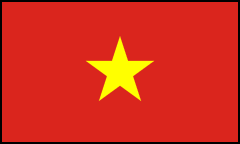
The tech landscape in Vietnam is changing at a very quick page. Not only the government calls for modernizing businesses and administration with the help of digital solutions by promoting a “4th industrial revolution”, but the growing incomes also allow for new kinds of consumption.
Indeed, Vietnam labor wages are quickly rising, as it became a middle-income country. Thus, companies must look for ways to gain productivity as competitive wages will soon be a thing of the past. These wages are more and more invested in the digital economy with eCommerce, lifestyle apps and more.
This situation makes for a fertile ground for tech investment in Vietnam, just like its ASEAN neighbors that went or are going through a similar situation (Indonesia, Phillippines…).
In this article, we will go through the current Vietnam technology state, reasons investors should invest in Vietnam and five trends for Vietnam IT sectors.
The situation is shifting in Vietnam, with local tech companies attracting foreign investments
2018 and 2019 witnessed the dramatic rise in Vietnam technology investment. Vietnam ranked the third position, preceded by Indonesia and Singapore, in the technology startup ecosystem among six ASEAN countries. The number of invested capital and technology deals increased by three times between 2018 and 2019, respectively $287 million and $ 741 million.
In particular, the three largest investments into Tiki, VNPay, VNG captured a total of 63% of investment which was $246 million.
Vietnam, after being a consumers’ market to Singaporean or Indonesian tech companies, is getting its own homegrown champions. Tiki, for instance, is bound to expand in ASEAN countries. Be is getting its own share of the ride-sharing business and is expected to grow exponentially.
Current Vietnam technology state
Since the start of the digital economy in 2000, the Vietnam technology sector has grown slowly initially. We can outline three generations of founders with outstanding mindsets and visions.
The first generation period started from 2000 to 2006 consisting of giant and influential startups such as VNG, Vatgia, NextTech, VCCorp, 24H, and Yeah1. At that time, these new startups quickly gained traffic and users and became leaders in the technology field, then a greenfield in Vietnam. When the core business reached a sufficient scope, they started to expand the business in more traditional sectors.
The second generation, between 2007 and 2014, was born in a more competitive environment. Batdongsan, Tiki, Foody, Topica, and Nhaccuatui appeared in this era, with a more focused and targeted approach, remaining mostly in their tech sector. These companies are now reaching sizable valuations, BatDongSan in particular.
Starting in 2015, the third generation brings distinct traits compared to predecessors. Unlike the two previous generations relying on the local market for growth, this generation sets regional mindsets based on the demand of local people and the enter of new competitors in Vietnam and focuses on developing robust technology as a competitive advantage. Kyber Network is a good example of this new type of company, as it provides a global cryptocurrency service.
Why invest in Vietnam’s IT sector?

There are three main reasons why foreign investors should invest in Vietnam technology.
A promising sector
First of all, technology in Vietnam is growing fast and believed as a promising land bringing many profits to investors. The tech ecosystem is continuing to expand its business both vertically and horizontally. In particular, the third generation or newcomers in the technology field are requiring capital and support from foreign investors, as they expand beyond their own home market.
Young and dynamic population
Second, regarding Vietnam's demographic, Vietnamese youth are more and more sensitive to technology and online purchases. Ecommerce, ride-sharing and lifestyle apps grow exponentially. GoViet, Grab or Be are sharing a massive market that adopted this new service in strides.
Also, the new generation is very competitive as tech workers. With a strong incentive for the government to train engineers and tech workers, Vietnam is becoming a tech powerhouse. It is even struggling to train enough engineers to meet the demand.
Government policies
The Vietnamese government strongly supports improving the quality of the technology sector in the country. Scholarship programs for Vietnamese tech talent and Vietnam Global Innovation Fund are an example of this goal. This program helps to train future talents via scholarships to study and work overseas.
Additionally, Vietnam has been successful in joining FTAs including EVFTAs and CPTPP. These agreements help strengthen the Vietnam economy and create more opportunities for foreign investors.
Besides, the Vietnamese government also issued Resolution 41/ NQ - CP on tax incentives to promote IT application and attract investment in this sector, for instance, removal of paperwork for e-commerce or tax-free policy for tech companies in several years.
Furthermore, tremendous investments like Hi-Tech parks in Hanoi, Da Nang, around Ho Chi Minh City to build smart cities are signs of the strong will of Vietnam in turning the whole country digital. This is an outstanding point of Vietnam from other countries like the Philippines, India or Indonesia.
More locally, cities are pushing for their own transformation through digital solutions. HCMC is being very ambitious with its smart city projects, that have started to yield results.
Top 6 trends for Vietnam IT sector in 2020 to watch out for

Fintech
Vietnam’s Fintech industry is predicted to reach USD $7.8 billion in 2020. A dynamic young population and a keen-on-Internet middle class are fundamental factors to help Fintech thrive in Vietnam. Digital payment is the most popular and potential segment highlighted with famous names such as Zalo Pay, MoMo and Moca. Besides, peer-to-peer lending also becomes more and more popular with Timo, Growth Wealth and Trust Circle.
Artificial Intelligence
AI is a global trend and Vietnam is a promising segment to deploy AI in business operations or in daily life. Vietnam is trying to apply AI in human resources, education, healthcare, transport, and e-commerce.
Viettel - one of the biggest companies in telecommunication in Vietnam - has used AI to prevent cyberattacks and help businesses manage internal IT security.
The growth of e-commerce and data-driven marketing will require more investment in adapted AI.
E-Commerce
According to the E-Business Index 2019 presented by the Vietnam Ecommerce Association, e-commerce in Vietnam is expected to rank the third position, preceded by Indonesia and Thailand by 2025. Hanoi and Ho Chi Minh City are two places where e-commerce activities excite a lot of citizens.
When it comes to Vietnam’s e-commerce, popular brands that can not be ignored are Tiki, Sendo, and Shopee. These domestic brands are able to compete directly with regional competitors like Lazada. Despite attracting over USD 1 billion in funding, Vietnam’s e-commerce still encounters difficulties relating to logistics costs and customer trust.
Software outsourcing
Vietnam is a competitive destination for software outsourcing, recording a revenue of USD 8.8 billion in 2018. The local tech teams are competing very strongly with the regional champions: India and the Philippines. The government intends to develop high-tech parks and offer incentives to boost this sector.
Education technology
Vietnam’s education technology (Edtech) had received USD 55 million of investment in 2018. Edtech attracts plenty of investors from Singapore, Korea, and Australia to improve the standard of education. Students from kindergarten to grade 12 are invested around 40% of parents’ disposable income, hence investing technology in education is more potential. Vietnam’s Edtech firms have been successful in the segment including Hocmai.vn and Topica.
Smart cities
Vietnam is planning for smart city projects in major cities such as Hanoi and Ho Chi Minh city to optimize the traffic flow, reduce energy consumption and automate waste management. HCMC has been building its smart city project for two years while Hanoi has started the project, according to the Deputy Chairman of the Hanoi People’s Committee. Hanoi has achieved initial results including the construction of information infrastructure, corporate information application, state management, and residential data.
Besides, you can search relevant articles relating to Vietnam information technology such as the average salary for tech talents in Vietnam or how to hire blockchain developers.
In conclusion, Vietnam is in the works to become a tech powerhouse. The government is trying to bring more opportunities for IT to develop further and consider IT as a top priority to modernize the economy. As a result, investment from foreign companies will bring profits to investors as well as create a long-term impact on IT in Vietnam.
Viettonkin Consulting stands by your side with international know-how and local knowledge for the fast-growing companies throughout the region. If you have any questions, please feel free to contact us via email: info@viettonkin.com.vn or hotline: +84 918 866 858.









